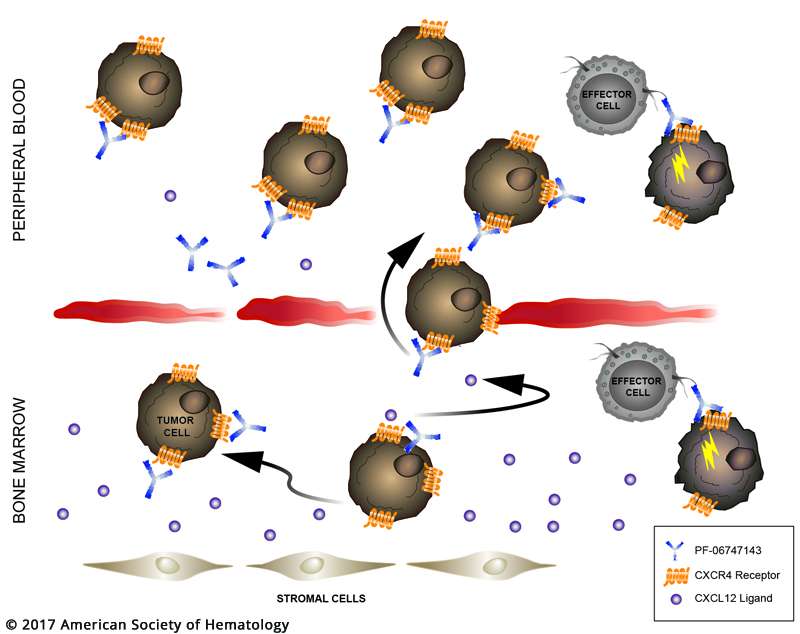New antibody uses 1-2 punch to potentially treat blood cancers

Researchers have developed a two-pronged approach to blood cancer treatment: 1) attacking cancer cells directly and/or 2) driving them from the nurturing bone marrow environment into the peripheral blood streams, where they are more vulnerable (for example, to chemotherapy).
The findings of multiple in vivo preclinical studies published online today in Blood Advances, a Journal of the American Society of Hematology (ASH), indicate that this therapy could potentially treat multiple cancers, including non-Hodgkin lymphoma (NHL), multiple myeloma (MM), and acute myeloid leukemia (AML).
"One of the major limitations we see in treating blood cancers is the failure to clear cancer cells from the bone marrow," said Flavia Pernasetti, PhD, of Pfizer Oncology Research and Development. "Because the bone marrow allows the cancer cells to flourish, removing these cells is an essential step in treating these malignancies effectively. Not only does our approach have the potential to get these cells out of the marrow, making them more susceptible to standards of care, it is designed to also directly attacks the cancer cells.
"Our preliminary preclinical results are encouraging, and we are very excited to see how our antibody fares in clinical testing."
How it works
The bone marrow serves as a protective home for cancer cells, providing nourishment that allows them to multiply. Recognizing the relationship between bone marrow and cancer resilience, Dr. Pernasetti and her team focused their approach on mechanisms that would drive the cancer from the marrow. To do so, the team looked to the mechanisms that control the movement of cells into the bone marrow in the first place—CXCR4, a chemokine receptor, and its ligand, CXCL12.
While there is extensive research into agents that inhibit CXCR4 the research team sought to improve upon the concept by taking it one step further. They created an antibody, PF-06747143, that not only moves the cells into a less protective environment, where they can be killed by other treatments, but also has been shown preclinically to attack the cells and kill them directly.
How well it works
Researchers observed the efficacy of the antibody alone or in combination with standard chemotherapy in mouse models of NHL, MM, and AML. In all instances, treatments involving the antibody - whether alone or in combination with chemotherapy - appeared to eradicate more cancer cells compared to standard care.
Notable success was observed in AML. When the antibody was used as a standalone therapy, researchers saw a 95.9 percent reduction in cancer cells. When used alongside standard chemotherapy agents daunorubicin and cytarabine in a treatment-resistant AML model, 99.7 percent of cancer cells were killed.
Safety and early signs of efficacy of PF-06747143 are currently being evaluated as part of a Phase I clinical trial in AML patients. "PF-06747143 could potentially be used as a standalone therapy for patients who are not candidates for standard care or used in combination with chemotherapy," noted Dr. Pernasetti.















